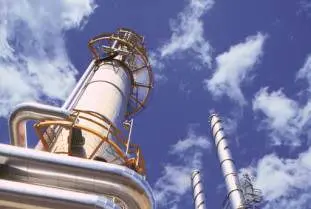Adriano Gentilucci, Commercial Director, IMEA for Dow Oil, Gas & Mining, spoke to Oil Review Africa about the companys new gas sweetening service
What is the Dow AMINE MANAGEMENT programme?
The Dow AMINE MANAGEMENT programme is a comprehensive gas sweetening service program tailored to each customer’s performance objectives, to help them optimise their total system costs. The programme is designed to achieve environmental compliance while improving reliability, reducing energy costs and preserving the integrity of assets. The service program uses Dow’s proprietary state-of-the-art simulation software, which offers customers best-in-class performance prediction technology.
Why is there a need for such a programme?
One of the main challenges facing sour gas processors in the Middle East today is that of efficient amine management. Amines, a chemical compound used to treat sour gas and liquids by removing harmful hydrogen sulphide (H2S) from the useable gas, works best in cool conditions, which means the added costs of thin fan coolers or chillers to the sweetening process. Our amine management technology works by allowing the amines to operate efficiently for H2S removal even at relatively high temperatures. This eliminates the cost for cooling the amines. In addition, energy savings can be reached through reduced reboiler duty and decreased pumping requirements due to lower solvent circulation. Heat Stable Amine Salts (HSAS) can adversely impact amine-based gas treating systems by causing corrosion, reduced amine capacity, poor unit operations, reduced solvent life and solvent disposal problems. Dow has developed a program that minimises the problems associated with HSAS, maximises solvent life, and restores operational reliability. Dow’s Heat Stable Salt Management programme, a part of Dow’s programme is based on a low total cost approach to treat HSAS, reduce HSAS contamination, and minimize the corrosion from HSAS.
How does the programme work?
The starting point of the programme an on-site visit from Dow’s amine experts. Experienced technical service engineers perform an initial survey of the amine system, including sample and data collection. These are analysed and evaluated via a proprietary simulation tool, which identifies and quantifies opportunities for system optimisation. Customised recommendations may include improving amine efficiency through the use of UCARSOL™ Specialty Solvents, a proven line of specialty amines that allow for tailored contaminant removal and reduced energy consumption. They may also identify opportunities to extend solvent life and reduce corrosion potential through the use of Dow’s UCARSEP process for heat stable salt management.
In addition to analytical services, the programme offers training and start-up support, as well as continuous system support, including on-call and periodic planned site visits to review process data and provide additional optimisation recommendations. The program is flexible and customers can pick and choose the services that they wish to subscribe to, whether it’s strictly analytical, a combination of analytical and technical support, or the full spectrum of initial analysis and ongoing process support. Typically, there is no interruption to production and no capital investment required to achieve significant improvements in energy savings, capacity increases, reduction in solvent usage and more stable operations.
What are the benefits of the Dow AMINE MANAGEMENT programme?
Dow collaborates with customers to improve amine plant performance and help sustain performance gains over the long term. We work closely with a facility’s operational team to help ensure that the gas treating facility is operating at optimal performance. The programme is implemented as a comprehensive monitoring and maintenance service program designed to help optimize amine usage, reduce energy use, maximise solvent life, and minimise contaminants and corrosion. Moreover, the increased demand for energy worldwide has pushed refiners to increase crude processing flexibility to tolerate heavier, sourer crudes. At the same time, environmental regulations require refiners to emit less sulfur. Under the programme, UCARSOL specialty solvents have become an industry standard for the most complete removal of H2S and trace sulfur. Dow works with customers to help their facilities meet stricter environmental regulations, while also helping operations run more efficiently, resulting in an environmentally compliant, cost effective solution.
What makes the programme a competitive solution for the market?
Dow combines in-depth industry knowledge, chemistry expertise and advanced innovation capabilities with deep application expertise in solvents for superior acid gas removal and amine system operation. Our technicians utilise a proprietary simulation tool backed by data collected from more than +1200 gas-treating plants worldwide. Through this, they are equipped to assist in optimising gas treating systems, thus providing great value to a facility. The program also offers a best-in-class analytical lab that performs thousands of customer analyses annually, while providing a remarkable turnaround time versus the industry average. And finally, the programme offers an in-depth selection of UCARSOL specialty solvents that provide superior performance, allowing for tailored contaminant removal and reduced energy consumption.
Is it being deployed in African markets?
It is estimated that Dow solvents are used to treat the majority of the region’s liquid natural gas. Our progamme is employed worldwide to upgrade existing plants and design new plants for optimum gas processing efficiency and output. Dow has more than 50 gas treating references in the Middle East, including plants in Kuwait, Qatar, Oman, Saudi Arabia and the UAE. These references include the use of Dow UCARSOL and SELEXOL solvents in five world-scale LNG plants in Ras Laffan, Qatar. In Africa as well, our locally based technical experts are actively engaged with the major operators to provide Dow’s solutions in helping treat sour gas in the key markets of Egypt, Libya, Tunisia and Nigeria. For example, Dow’s UCARSOL AP 810 solvents are used in the gas fields at Nalut, Libya.




